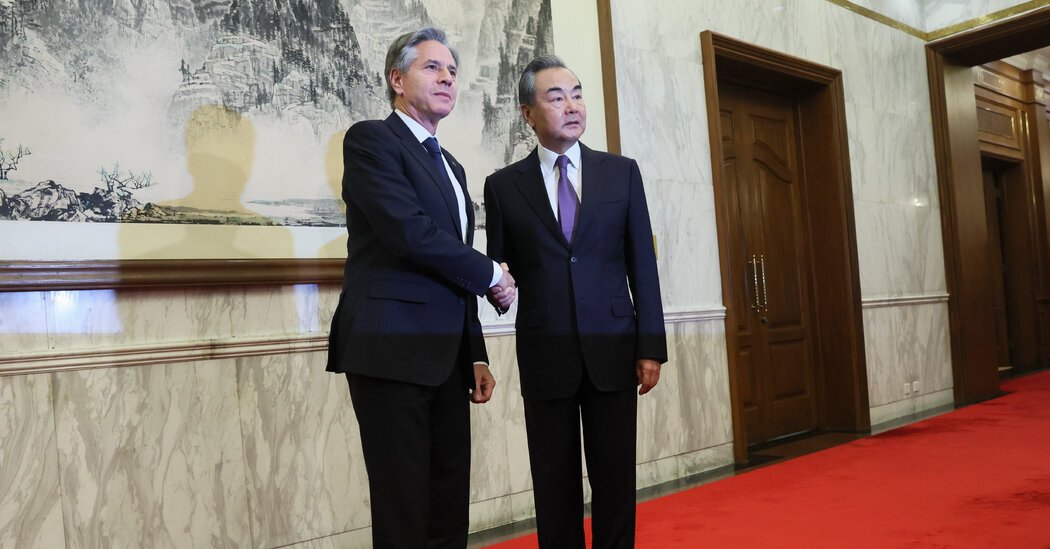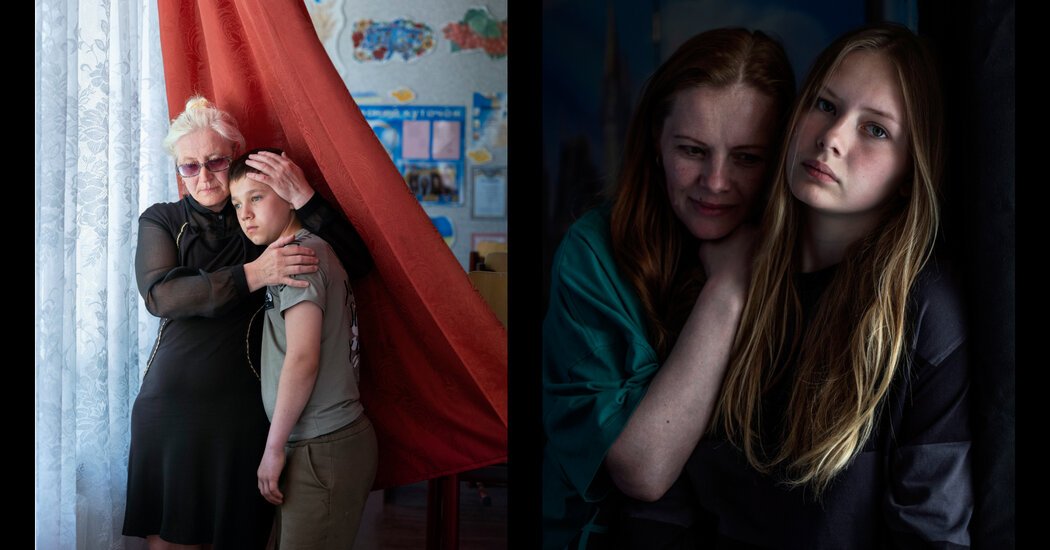When Liz Gouari was making plans to move from Africa to join her husband in a rural stretch of northern Quebec, he promised her that Canada was a tranquil nation.
But on Wednesday, the couple was among dozens of people sitting in stunned disbelief in an evacuation center after the entire city where they lived was forced to flee from a raging wildfire.
The blaze tore through the forest and bore down on their city, Chibougamau, one of the countless Canadian communities affected by an extraordinary outbreak of forest fires whose smoke has blotted out skies across swaths of North America and forced millions indoors because of hazardous air quality.
Growing up in the Republic of Congo, Ms. Gouari and her husband, Rey Steve Mabiala, said they were familiar with evacuations of all sorts — he had once fled fighting by hiding in a tropical forest — and with how floods and droughts made worse by climate change were causing major displacements on the continent.
“Back home in Africa, there are many climate refugees, but I never thought I would become one in Canada,” said Mr. Mabiala, 42, who arrived in Canada in 2018, and was joined last month by Ms. Gouari, 39, after he became a permanent resident and sponsored her admission into the country.
With three months left in Canada’s wildfire season, blazes have already scorched more than 10 times the acres of land burned by this time last year. The size and intensity of the fires are believed to be linked to drought and heat brought on by a changing climate.
Fires are burning in forests in all of Canada’s provinces and territories, except the province of Prince Edward Island and Nunavut, a northern territory that sits above the tree line, where temperatures are too low for trees to survive.
“My wife keeps telling me, ‘But how could this happen? You always promised me that Canada was a peaceful country, but now we’re starting to flee as if we’re back home,” Mr. Mabiala said, glancing at his wife, who had a blank stare and could only murmur that she was “shocked.”
The outbreak has hit not only the western provinces traditionally prone to wildfires, but also provinces in the east, like Quebec, where it is rare for so many fires to burn simultaneously and whose residents have little experience evacuating from such blazes.
Of the more than 400 fires now burning in Canada, more than one-third are in Quebec, which has already registered its worst wildfire season on record.
“It’s really an exceptional year,” said Josée Poitras, a spokeswoman for Quebec’s wildfire prevention agency.
As even extremely cold regions in Canada become warmer, increasing temperatures and a “vapor-pressure deficit,’’ or a lack of moisture in the air, are making trees drier, said Tanzina Mohsin, a professor of physical and environmental sciences at the University of Toronto.
“We are facing some unprecedented events, including droughts, accelerated fires and heat waves, and there will be more over time, especially forest fires,” Ms. Mohsin said.
The wildfires in Quebec were sparked last week by a single lightning strike near Val-d’Or, a city about 200 miles southwest of Chibougamau, following an unusually dry spring, Ms. Poitras said, adding, “In one day, we got 200 alerts from people reporting that they had seen smoke, and that resulted in more than a hundred fires, which have gradually increased.”
In Chibougamau — a city of 7,500 people about 430 miles north of Montreal by road — city officials issued an evacuation order late Tuesday, only hours after having said that a firewall would contain the encroaching blaze. But with the fires only 15 miles away and picking up speed, residents jumped into vehicles and began heading south.
Many arrived in Roberval, a city about 150 miles southeast of Chibougamau. A drive that usually takes a couple of hours took two to three times longer as a caravan of cars and trailers moved slowly down the highway in the middle of the night.
“I’ve lived in Chibougamau for more than 40 years, and I’ve never experienced a situation like this,” said Francis Côté, 71, who was staying with other evacuees at a sports center in Roberval. “It’s the first time I’ve had to evacuate because of a wildfire.”
It was the first time that all of Chibougamau had to evacuate because of wildfires, though residents in parts of the city had been forced to leave in 2005.
Inside the large sports center where evacuees were sheltering, people sat and slept on cots, with single suitcases next to them. Some had brought along their pets.
The authorities had blocked all roads leading up to Chibougamau and other areas threatened by the wildfires, and it was unclear when residents would be allowed to return or what they would find once they did.
In an odd twist, while smoke from the wildfires was wafting across the East Coast of the United States, there was no smell or visible smoke in Roberval and other areas just south of Chibougamau on Thursday.
A combination of factors, fire officials said, laid the groundwork for the spread of wildfires in the Chibougamau area: freezing rain that weighed down trees and littered the forest floor with broken branches that became tinder; and unusually dry ground because snow melted earlier than usual and there was little rain in the spring.
Built on mining and the logging industry, Chibougamau is one of the few bold names on maps of Quebec’s vast, thinly populated northern regions. For many in Quebec, it is a mysterious place associated with remoteness and extreme cold.
But Chibougamau is also being hit by the effects of global warming. Longtime residents said that the evacuation followed years of change in their community.
Since retiring as a mining worker a decade ago, Mr. Côté has managed an outdoor skating rink in Chibougamau. Fewer months with below freezing temperatures have shortened the skating season, and erratic temperatures have made it more difficult to maintain a clean, smooth ice surface.
“This year, there was a thaw in January,” he said. “It melted, I had to start over, and it took a week to remake the ice.”
“We can really see that it’s global warming that’s impacting us more and more,” Mr. Côté added. “Every year, it gets worse.”
When Guy Boisvert, 79, moved to Chibougamau as a child, a white fog blanketed much of the city in winter, as temperatures regularly dropped to minus 45 Fahrenheit. Winters were long, and May brought a lot of showers, making wildfires rare and manageable.
“Sometime we’d see a small wildfire, and it would last a day or two,” Mr. Boisvert said.
His wife, Shirley Gallon, 75, who has lived in Chibougamau for 53 years, added, “We never imagined we’d have to evacuate from Chibougamau.”
More recently, because of warming temperatures, the golf season has lengthened in Chibougamau, said Jonathan Mattson, 42, a city councilor and fervent golfer.
A couple years ago, the golf season began starting a full month earlier, in mid-April. Normally, the golf course feels wet.
“But this year, when I walked on the course, it was crispy — very, very dry,’’ Mr. Mattson said.
But perhaps most surprised were newcomers to Chibougamau, like Mr. Mabiala, from the Republic of Congo, who came to work in logging.
Two women from the Philippines, Ruth Cabrera and Anna Huerte, said they had experienced evacuations back home after floods and volcano eruptions.
A familiar dread — of being at the mercy of natural forces beyond their control — returned as the wildfires approached Chibougamau, turning the sky red and yellow.
Ms. Cabrera, 49, who works at a McDonald’s in Chibougamau, and Ms. Huerte, 38, who works in logging, said they did not realize how climate change could upend lives in Canada.
The two women said that their relatives in the Philippines had been astonished to learn about their evacuation.
“They were asking, “Oh, is there such a thing in Canada?’ ’’ Ms. Cabrera said.





